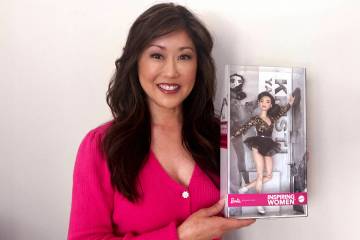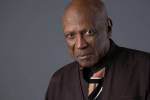Audience setup heightens ‘Closer’s’ voyeuristic feel
There's close, and there's "Closer."
Patrick Marber's blistering 1997 play (and its 2004 movie version, with Julia Roberts, Natalie Portman, Jude Law and Clive Owen, who also appeared in "Closer's" original London production) is all about contemporary relationships - and the games people play within, and without, them.
But Atlas Theatre's production of Marber's play, which opens an eight-performance run tonight at downtown's Box Office theater, evokes one game in particular: tennis.
That's because director Chris Mayse has opted to stage the action "tennis-court style," with the actors in the middle and audiences on opposite sides of the stage, facing each other.
"People can watch the action unfold - and they can watch each other watching the action unfold," Mayse says, noting that the tennis court setup heightens the play's "kind of voyeuristic, narcissistic mentality."
That in turn reflects the mindset of "Closer's" quartet of sometimes desperate, sometimes duplicitous characters who collide during a 4½-year period in contemporary London.
There's Dan (Ryan Remark ), a writer - of obituaries - who helps Alice (Jessica Afton), a lost soul working as a stripper, by taking her to the hospital after she's hit by a car.
"What do you want?" Dan asks Alice as verbal, and unspoken, sparks fly between them.
"To be loved," Alice replies.
And when Dan questions her simple desire, Alice informs him: "It's a big want."
The play's second scene flashes forward more than a year, after Dan has written a soon-to-be-published book - about Alice - and is posing for publicity photographs.
The photographer, Anna (Breon Jenay ), is everything the needy Alice isn't: adult and assured, with her own career. She's also separated from her husband.
But, ultimately, Dan has competition for Anna's affections: Larry (Alex Olson), a dermatologist who joins "Closer's" romantic roundelay after "meeting" Anna in sex-chat cyberspace.
Time magazine's review of "Closer's" 1999 Broadway production describes the play as "a bruising dissection of modern relationships, in which sex is the subject even when it's not, honesty is frequently not the best policy, and people with choices almost always make the wrong one."
In addition to the characters' interlocking relationships, however, it's their "relationship with the truth" that drives "Closer," Mayse says.
After all, "one person's relative truth is someone else's absolute truth," he says.
The Box Office's intimacy, combined with "Closer's" tennis-court staging, should enhance the play's themes - and their impact, Mayse adds.
Given Marber's flair for rapier-sharp dialogue, it's hardly surprising that "Closer's" language plays a major role in the Las Vegas production - especially when, "at some points, you're not going to see the actor's face," Mayse notes. "You're only going to hear the words and the actor's intonation. That's part of the experiment."
It's an experiment Mayse has long wanted to stage.
"I've had the script in my back pocket for about 10 years," he says.
After returning to Las Vegas from Seattle, where he founded Atlas Theatre, Mayse "shared the script with people" and "had the production on the burner a couple of times," but the various elements "never had the opportunity to come together."
At least not until he saw a show at The Box Office and decided he had found the ideal space for his vision of the play.
"We're not doing 'Les Miserables,' where we have to have a turntable," Mayse says of the elaborately staged megamusical. "This is a story about truth, about relationships, about love and sex."
And for Mayse, "it's about doing stories that engage an audience - and me as an artist," he explains.
To that end, "Closer's" Oscar-nominated movie adaptation might heighten audience interest, or at least title-recognition, in his production, Mayse acknowledges.
Besides, "you always fall into that trap" of fulfilling audience expectations after a big-screen version of any play, he contends, citing stage productions of "A Streetcar Named Desire" that inevitably conjure memories of Marlon Brando's legendary portrayal of "Streetcar's" Stanley Kowalski.
With "Closer," Marber's screenplay differs from his stage original, Mayse points out.
The two are similar in the first act, he says, but the second act features different scenes, giving audiences "information in the play you never got in the film," the director says. In trimming some scenes for the big screen, "some great, nuanced stuff gets lost."
More importantly, Marber's edgy tale gets told through a whole new set of eyes.
"This isn't the Jude Law 'Closer' or the Natalie Portman 'Closer.' This is our 'Closer,' " Mayse says, a play with a script that presents "so many questions and options" that Atlas Theatre's production can't help but offer "a different perspective."
And that, he concludes, is "the beautiful part of theater. It's regenerative."
Contact reporter Carol Cling at ccling@reviewjournal.com or 702-383-0272.
Preview
"Closer"
8 p.m. today and Saturday; also 8 p.m. Sept. 6, 4 p.m. Sept. 9, 8 p.m. Sept. 10, 8 p.m. Sept. 13-15
The Box Office, 1129 Casino Center Blvd.
$15, available at the door (884-5190, www.atlastheatre.org)






























